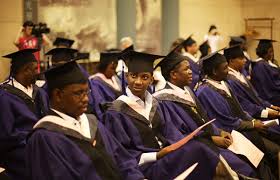Educational Issues
Why We Must Appreciate Our Dons -By Yusuf Sani
Lecturers in Nigeria have received significant pushbacks for advocating welfare of academic personas through their respective unions, if the government and responsible individuals that are goal-oriented appreciates their contribution by inspiring them to explore innovative teaching methods and pedagogical techniques and by recognizing the value of lecturers’ expertise, universities also can invest in their professional development.

As university students, we are often embedded with academic pressure, demanding coursework, and never-ending deadlines. In the academic chaos, we used to overlook the pivotal role our lecturers play in shaping our educational journey; not only that, we acquire all sort of training that promotes oneself and societal development. There are immense undeniable benefits university students get from lecturers especially Nigeria’s lecturers that not only contribute to academic community and society, but they willingly gave up their own desires and aspirations solely for students’ betterment. Aspiring scholars owe gratitude to these dedicated individuals who tirelessly share their knowledge and inspire us on our academic journeys, they make us to adjust the needful to be productive and have a meaningful life.
Our lecturers possess a wealth of knowledge and expertise in their respective fields. Their profound understanding of the subjects they teach demonstrates their commitment to research and learning. Their ability to simplify complex concepts and deliver them in a comprehensible manner makes the learning experience engaging, conducive, and accessible, ensuring students are well-equipped to tackle future challenges. Many Nigerian universities struggle with inadequate infrastructure and resources. Lecturers often have to contend with outdated facilities, limited access to research materials, and inadequate technology. These obstacles hinder their ability to provide a quality education and engage in meaningful research for the nation’s development.
Great lecturers possess unique ability to inspire and motivate students. Their passion for a subject matter is contagious, igniting curiosity and fueling the desire for knowledge. By sharing personal anecdotes, real-world applications, and thought-provoking examples, lecturers instill a sense of wonder and excitement in learners, fostering a love for lifelong learning.
They foster critical thinking skills, challenging students to question and analyse information critically. By encouraging diverse perspectives, thoughtful discussions, and constructive debates, they facilitate the development of intellectual autonomy. This enables students to approach problems from multiple angles, think independently, and develop understanding of complex topics.
Lecturers not only impart knowledge and information but also act as mentors, guiding students in their academic pursuits, this may be the reason degree certificates carries ‘…based on character and learning.’ They provide valuable feedback on assignments, help students navigate through complex topics, and offer support during stressful periods. I heard and read about so many lecturers that provides financial assistance to students not only in their institutions their passion for teaching extends beyond the classroom, as many of them go extra mile to assist students in deciding career choices and providing guidance for post-graduation endeavors.
Lecturers serve as academic resources beyond the four walls of the classroom. They offer office hours, respond to calls and messages and provide personal consultations to address students’ individual concerns. This accessibility meant that students receive prompt clarification and further guidance, enhancing their learning experience and fostering a collaborative academic environment. Lo and behold, this has become a thing of concern where the lecturers become perpetrators of their own victimisation necessitating lecturers’ reputations getting compromised.
It is very crucial to recognize that relationships between a lecturer and the student are purely academic that is based on respect and appreciation that creates, supports, and encourages open communication and collaboration. In this relationship lies the possibility of influencing a student and become their role models, demonstrating professionalism, perseverance, and an everlasting commitment to learning and character that are worth emulation. They impart valuable life lessons, encouraging students to embrace challenges, be resilient, and cultivate a growth mindset; they offer practical advice and sharing personal experiences anticipated overtime.
Feeling connected to our lecturers can contribute to a sense of belonging within the academic community. When we love and respect our lecturers, we develop a strong bond with them, realizing that they are not just educators but allies in our educational journey. Such connections can enhance collaborative interactions with other groups and create a supportive and inclusive learning environment. To love and obey lecturers will allow us to tap into this invaluable resource by seeking mentorship. By establishing such relationships, we are provided with guidance, advice, as well as networking opportunities that can propel us toward success in our academic and professional fields.
Lecturers in Nigeria have received significant pushbacks for advocating welfare of academic personas through their respective unions, if the government and responsible individuals that are goal-oriented appreciates their contribution by inspiring them to explore innovative teaching methods and pedagogical techniques and by recognizing the value of lecturers’ expertise, universities also can invest in their professional development. Providing opportunities for workshops, conferences, and research grants can enhance their skills, stay updated with technological and intellectual advancements in their fields, and refine their teaching methodologies.
It is worth noting that by the virtue of what was taught, the previous generations defeated the ill-trade of slavery and this deemed to be the only possible way to enjoy any form of freedom that anyone could aspire to have, and also to have total inclusiveness in governance and leadership in all levels.
Acknowledging varsity dons undeniable benefit is not just about rewarding the work they do; it is an investment in the future of education and the development of a nation. Nigerian lecturers often receive low salaries and benefit packages. This not only affects their financial well-being but also dampens morale and motivation within. Adequate compensation is necessary to attract and retain talented ones who can make a significant impact on students’ education. Appreciating them opens the door to increased collaboration between lecturers and administrators, they are more likely to actively participate in discussions and decision-making processes regarding curriculum development and educational policies. This collaboration ensures that the education system evolves with the changing needs of students and society and the lecturers, most of the times; understand students’ capability and potentiality more than the people of their propinquities.
Academic officers in Nigeria and elsewhere are indispensable facilitators in the ‘academic journey’ that breeds intellectuals. Their unwavering dedication, expertise, and commitment to students’ successes foster immense contribution to comprehension and professional excelling.
Yusuf Sani, Department of Mass Communication,
Borno State University, Maiduguri.



















